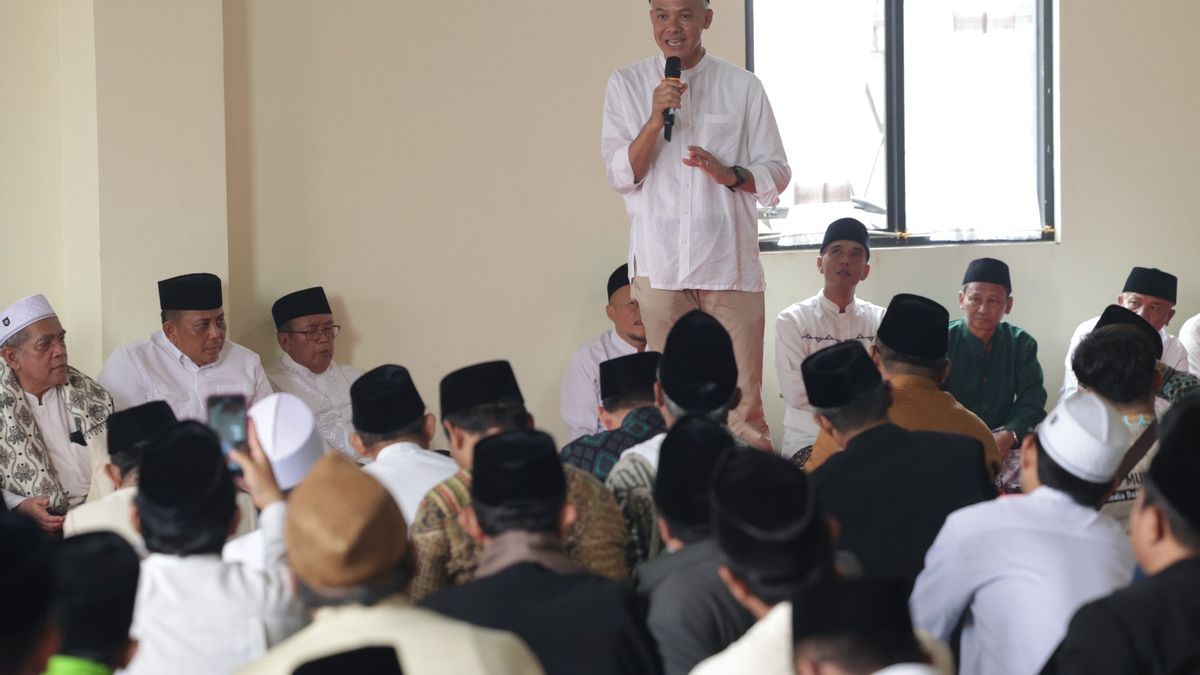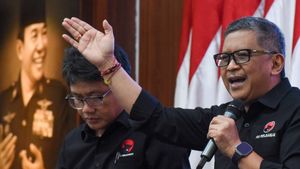PURWAKARTA - The Islamic Boarding School Law is still a problem among ulama in Indonesia. Although it has been ratified, the implementation has not been evenly implemented.
The issue was conveyed by hundreds of scholars throughout West Java during a dialogue with the 2024 presidential candidate Ganjar Pranowo at the Al Muhajirin Purwakarta Islamic Boarding School, Friday, November 17.
In the event which was attended, a number of scholars, kiai, assistants and caretakers of Islamic boarding schools from West Java and Jakarta, Ganjar emphasized that the Islamic Boarding School Law had been passed. Thus, it is mandatory for the government to carry out what is the mandate of the constitution.
"Today I have a relationship with scholars throughout West Java, the discussion is still the same regarding the Islamic Boarding School Law. I was asked what kind of commitment it was. I answered firmly, the law already exists, it's just a matter of implementing it. The government's duties from regents/mayors to governors are obliged to carry out because they have been sworn in," said Ganjar, greeted by applause from hundreds of scholars.
However, there are still many regions that have not implemented the Islamic Boarding School Law and made derivative regulations. In the future, the central government must encourage local governments to implement it and make regulations to provide certainty to ulama, santri and pesantren members.
"It's clear, if it has been passed and becomes a law, then it is mandatory for the government to implement it. It's actually simple, it's just our commitment to carry out the law's orders," he said.
Apart from the matter of the Islamic Boarding School Law, Ganjar also discussed many things with scholars throughout West Java regarding religious development. The former governor of Central Java for two periods conveyed how his efforts in advancing religion and Islamic boarding schools in Central Java.
Ganjar told how he always collaborated with scholars in every political decision. Many good policies were decided on input from ulama. For example, Central Java Bersholawat activities, collecting ASN zakat with Baznas, providing incentives for non-formal religious teachers, as well as providing assistance and helping the construction of Islamic boarding schools.
"So on this occasion I hope that there will be input submitted to us for the development of a better religious sector in the future. I will be very happy to receive criticism, suggestions and input. I and Pak Mahfud will try to realize the law going well, a good government and not corruption," he concluded.
Ganjar's statement received a positive response from scholars throughout West Java who attended. They are optimistic that Ganjar will be able to make Indonesia better, especially in the religious sector.
"We are sure that Pak Ganjar can build more quality people in the future. Not only knowledge and faith, but also skills. We are also optimistic that the Pesantren Law will run in the hands of Mr. Ganjar," said Al Muhajirin Islamic Boarding School Leader Kiai Abun Bunyamin.
The same thing was conveyed by Kiai Muin Abdurrahim, caregiver of the Miftahul Islamic Boarding School, Huda Al Azhar, West Java. Kiai Muin said that while leading Central Java, Ganjar had proven many things in developing society and building religion.
"We see that he has done good things in Central Java and we hope that he can be brought to the national level if in the future he gets a mandate at the national level," he said.
SEE ALSO:
Moreover, continued Kiai Muin, the representative who will accompany Ganjar is Prof Mahfud who is also from the Islamic boarding school. Apart from students, Mahfud is also a legal expert who has firmness and commitment in law enforcement.
"Of course this will help Pak Ganjar in the success of religious programs, including the Islamic Boarding School Law. We are optimistic that Pak Ganjar and Pak Mahfud can carry out the Islamic Boarding School Law properly and all regional heads will make a regional regulation regarding the Pesantren Law," he concluded.
The English, Chinese, Japanese, Arabic, and French versions are automatically generated by the AI. So there may still be inaccuracies in translating, please always see Indonesian as our main language. (system supported by DigitalSiber.id)


















